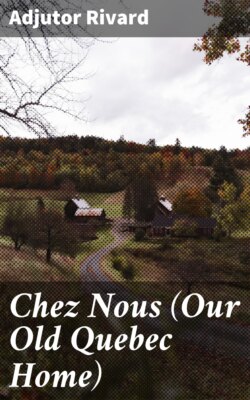Читать книгу Chez Nous (Our Old Quebec Home) - Adjutor Rivard - Страница 4
На сайте Литреса книга снята с продажи.
TRANSLATOR’S NOTE
ОглавлениеTable of Contents
A translator’s perplexities begin with the title; for Chez Nous, like ‘home,’ is without near equivalent in the opposite tongue;—possibly the colloquial ‘our place’ would be the closest rendering. But they do not end with it, for words and phrases of the old dialect (or dialects), smacking of the soil, multiply on Judge Rivard’s page, and to suggest their raciness and vigour is next to a hopeless task.
Taking the reader into confidence, I invite him to English il laboure une beauté mieux que les autres et prend plus de mie, or la bordée de ce soit a presque abrié les balises, or c’est matin pout les lièvres, or le brayeur émouchait sa poignée, or il n’y avait pas une jeunesse pour t’accoter; if a doctor, he might outline the appropriate treatment for les auripiaux, les reculons, les déteurses, les tours de reins, les échauffaisons, les efforts, les mordures, les verrures, les grenouilles, les tours d’ongles; and advise whether the surgical arm should be invoked in the case of one who has been unhappy enough se décrocher la palette de l’estomac!
A great deal is necessarily lost in every process of stripping ideas to the buff and re-clothing them in a foreign dress, but here more than usual. Moved by such a thought, did not a great modern translator thus lay down the canons of his art: ‘Fear God, honour the King—and don’t translate!’
Some may be willing to halt for a moment’s enquiry as to the idiom which the author uses so freely and tellingly—what it is and whence it came.
The immigrants of the XVII century, deriving from more than a dozen parts of France—in the west, the north-west and the north—brought with them their several peasant dialects. These have never completely merged, and the peculiarities surviving to-day serve to identify the places of their origin. Words used in one district or settlement are unknown elsewhere in Quebec, and others bear different meanings in different localities. Between the North and the South Shores there is a cleavage which the ear can easily detect. But the uniformity is substantial enough to make a speaker intelligible everywhere.
A fact less well known is that the various dialects spoken in France at the time of the emigration are not there wholly extinct. A young Parisian who had lived much with the peasants and sailors of Normandy did not find himself staggered by the words and the phrases of the North Shore which are often treated with discredit as local patois: conversely, he was unable to puzzle us of Charlevoix with his farming and seafaring terms.
The more lettered the Frenchman—in a wide sense—the less of difficulty he encounters in Quebec. But if he command only the French of the Boulevards he will meet at least initial obstacles of language, intonation and pronunciation.
Let it be well understood that these brief remarks relate to the tongue of the people—whereof comparative illiteracy has been long a sure preservative—and in no wise to the speech of the cultured.
Summing up the question in a broad way, and not too inaccurately, the French-Canadian in the main talks sound French. For the rest I take leave to quote from Judge Rivard’s Etudes sur les Parlers de France au Canada: ‘French-Canadian is a regional speech, relatively but not entirely uniform, and preserving traces of divers patois elements which belonged to the language of the common people in parts of the north of France. To which it must be added that, like every transplanted language, it has preserved a form archaic in comparison with that of the mother country, and has borrowed from foreign tongues with which it has been brought in contact.’
In Maria Chapdelaine, Louis Hemon little more than hinted at the vernacular: Judge Rivard has made it a labour of love to seek out and embody in his graceful prose those forceful old words which ring so musically and ‘mean just what they say.’
A pity, indeed, that they are less and less frequently heard on the lips of the rising generation—levelling downwards to a dull indistinction beneath the Procrustean hand of ‘education!’
Chez Nous was crowned by the French Academy in 1920, and is far more widely known in Quebec than any English-Canadian book giving an account of life in Ontario.
If the graces of its style disappear in this alien garb, something of the intimacy and fidelity of its portraiture may survive; and those who love our country and our countrymen will find reward in the reading.
How many of our petty differences rest in sheer incomprehension, and vanish upon that closer acquaintance which it is at once a pleasure and a duty to cultivate!
There is no surer guide-book to the ways and manners of Quebec than Chez Nous, for the author delves beneath the surface and lays bare to us the generous and kindly French-Canadian heart.
W. H. Blake.
